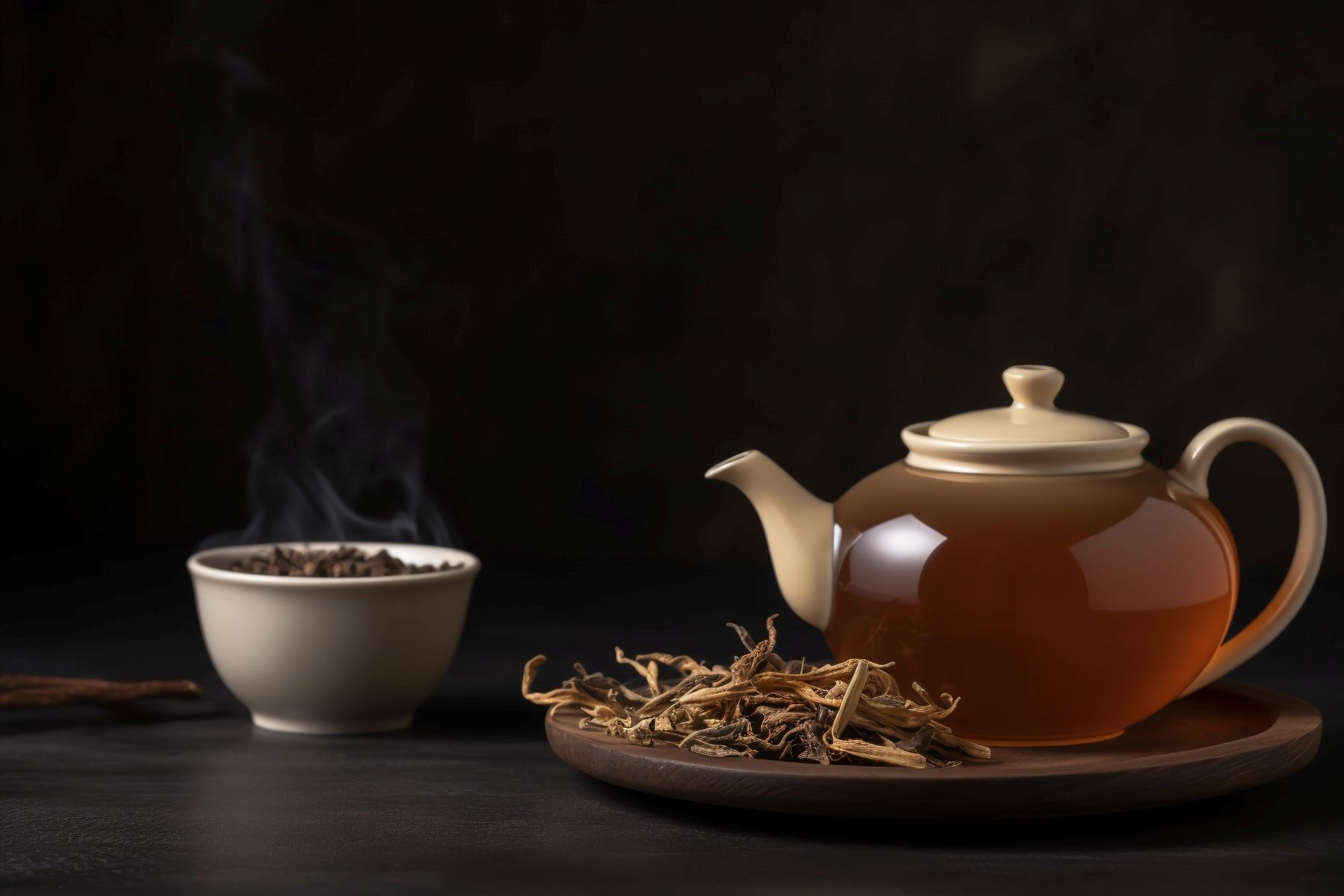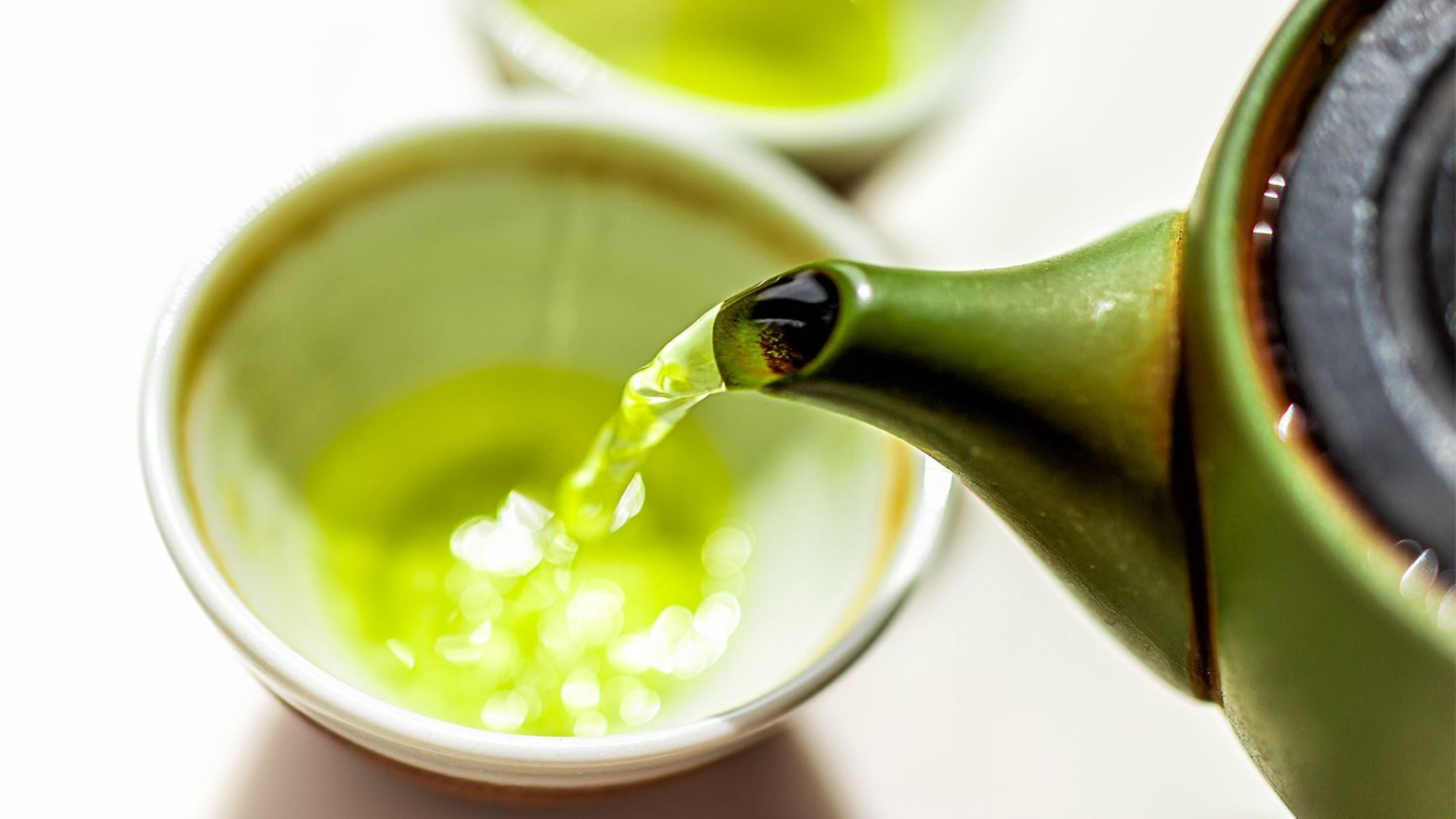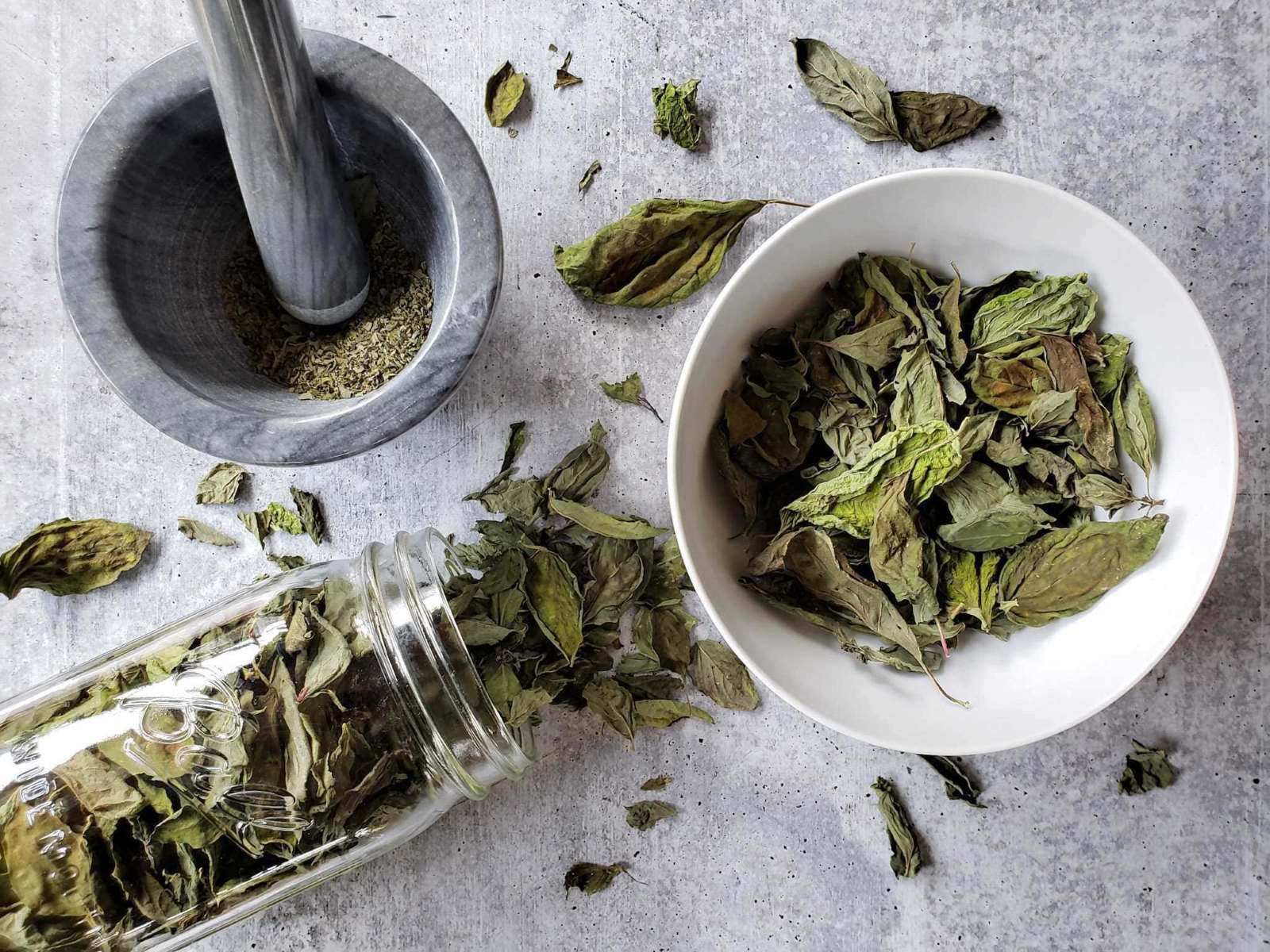Home>Food and Cooking>Discover The Perfect Recipe For Ashwagandha Tea!


Food and Cooking
Discover The Perfect Recipe For Ashwagandha Tea!
Published: January 15, 2024
Explore the ultimate guide to preparing delicious Ashwagandha tea with our expert tips and recipes. Elevate your food and cooking experience today! Discover the perfect blend now.
(Many of the links in this article redirect to a specific reviewed product. Your purchase of these products through affiliate links helps to generate commission for Regretless.com, at no extra cost. Learn more)
Table of Contents
Introduction
Ashwagandha, an ancient medicinal herb renowned for its numerous health benefits, has been an integral part of Ayurvedic practices for centuries. This powerful adaptogen has gained widespread popularity in the modern wellness community due to its remarkable properties and versatility. One of the most delightful and soothing ways to incorporate ashwagandha into your daily routine is by preparing a warm and comforting cup of ashwagandha tea. This invigorating beverage not only offers a delightful sensory experience but also provides a myriad of health advantages, making it an excellent addition to your wellness regimen.
As we delve into the world of ashwagandha tea, we will explore its origins, delve into its remarkable health benefits, and guide you through the process of crafting the perfect cup. Whether you are a seasoned tea enthusiast or someone seeking natural remedies to enhance your well-being, this article will equip you with the knowledge and skills to create a delightful brew that nourishes both the body and the soul. So, let's embark on a journey to unlock the secrets of this remarkable herbal elixir and discover the perfect recipe for ashwagandha tea.
Read more: The Perfect Combo: Ashwagandha And Beer
What is Ashwagandha?
Ashwagandha, scientifically known as Withania somnifera, is a revered herb deeply rooted in the ancient Indian system of medicine, Ayurveda. Often referred to as "Indian ginseng" or "winter cherry," ashwagandha holds a significant place in traditional healing practices due to its remarkable adaptogenic properties. The name "ashwagandha" is derived from Sanskrit, with "ashva" meaning horse and "gandha" meaning smell, alluding to the herb's distinct horse-like odor and its ability to impart strength and vitality, much like a horse.
This potent herb belongs to the Solanaceae family and is indigenous to the dry regions of India, the Middle East, and parts of Africa. It is characterized by its small, greenish-yellow flowers and red fruit, with its roots and leaves being the primary parts used for medicinal purposes. The roots of the ashwagandha plant contain a rich concentration of bioactive compounds, including alkaloids, steroidal lactones (withanolides), saponins, and various nutrients that contribute to its therapeutic properties.
Ashwagandha is revered for its adaptogenic nature, which means it helps the body adapt to stressors, both physical and emotional, promoting overall balance and resilience. This herb is also known for its rejuvenating and revitalizing effects, making it a cornerstone of holistic wellness practices. Additionally, ashwagandha is celebrated for its potential to support various bodily functions, including immune health, cognitive function, energy levels, and hormonal balance.
In Ayurveda, ashwagandha is classified as a "rasayana," a category of rejuvenating herbs that promote longevity and vitality. It is believed to balance the three doshas – Vata, Pitta, and Kapha – in the body, thereby fostering harmony and well-being. The versatility of ashwagandha extends to its diverse applications, as it is used in various forms such as powders, capsules, tinctures, and teas, allowing individuals to harness its benefits according to their preferences and needs.
With its rich historical significance and extensive therapeutic potential, ashwagandha continues to captivate the interest of researchers, wellness enthusiasts, and individuals seeking natural remedies for holistic well-being. As we unravel the profound essence of ashwagandha, we will uncover its multifaceted benefits and explore the art of crafting a delightful infusion that embodies the essence of this revered herb.
Health Benefits of Ashwagandha
The health benefits of ashwagandha are as diverse as they are profound, encompassing a wide spectrum of physical, mental, and emotional well-being. This adaptogenic herb has garnered attention for its potential to support overall health and vitality, offering a holistic approach to wellness. Let's explore some of the remarkable benefits associated with ashwagandha:
-
Stress Reduction and Anxiety Management: Ashwagandha is renowned for its stress-relieving properties, aiding in the management of anxiety and promoting a sense of calm. Research suggests that the bioactive compounds in ashwagandha may help reduce cortisol levels, the hormone associated with stress, thereby mitigating the body's response to various stressors.
-
Enhanced Cognitive Function: Studies have indicated that ashwagandha may support cognitive health by enhancing memory, improving focus, and promoting overall mental acuity. Its neuroprotective effects are attributed to its antioxidant and anti-inflammatory properties, which may help combat oxidative stress in the brain.
-
Balanced Energy and Vitality: As an adaptogen, ashwagandha is revered for its ability to bolster energy levels and combat fatigue. By supporting adrenal function and optimizing energy production at the cellular level, ashwagandha may contribute to sustained vitality and resilience.
-
Immune System Support: The immune-modulating properties of ashwagandha make it a valuable ally in fortifying the body's natural defense mechanisms. It is believed to help regulate immune responses, promoting a balanced immune system function.
-
Hormonal Harmony: Ashwagandha is recognized for its potential to support hormonal balance, particularly in relation to the endocrine system. It may aid in regulating cortisol levels, optimizing thyroid function, and promoting overall hormonal equilibrium.
-
Musculoskeletal Health: The anti-inflammatory and analgesic properties of ashwagandha make it beneficial for musculoskeletal health. It is often utilized to alleviate discomfort associated with joint health and promote overall mobility and flexibility.
-
Mood Elevation and Emotional Well-being: Ashwagandha's adaptogenic nature extends to its potential to uplift mood and promote emotional equilibrium. It may help alleviate symptoms of mild depression and enhance overall emotional resilience.
-
Cardiovascular Support: Research suggests that ashwagandha may contribute to cardiovascular health by helping maintain healthy lipid levels, supporting blood vessel function, and exerting antioxidant effects that benefit the heart.
These are just a few examples of the extensive array of health benefits associated with ashwagandha. Its multifaceted nature and adaptogenic properties make it a valuable addition to holistic wellness practices, offering a comprehensive approach to nurturing overall well-being. As we proceed to explore the art of preparing ashwagandha tea, we will further appreciate the versatility and therapeutic potential of this revered herb.
How to Make Ashwagandha Tea
Crafting a rejuvenating cup of ashwagandha tea is a delightful and straightforward process that allows you to infuse the essence of this revered herb into a soothing beverage. Whether you prefer to savor it in the morning as a revitalizing start to your day or as a calming evening ritual, preparing ashwagandha tea at home is a rewarding experience. Here's a simple yet effective method to create this nourishing infusion:
Ingredients:
- 1 teaspoon of dried ashwagandha root or powder
- 1 ½ cups of water
- Optional: honey, cinnamon, or a splash of milk for added flavor
Instructions:
-
Prepare the Ashwagandha: If using dried ashwagandha root, crush it into smaller pieces to enhance its infusion. If using ashwagandha powder, measure out the desired quantity.
-
Boil the Water: In a saucepan, bring the water to a gentle boil over medium heat.
-
Infuse the Ashwagandha: Once the water reaches a gentle boil, add the prepared ashwagandha root or powder to the water.
-
Simmer and Steep: Reduce the heat and allow the ashwagandha to simmer in the water for approximately 10-15 minutes, allowing its beneficial compounds to infuse into the liquid. If using ashwagandha powder, a shorter steeping time of 5-7 minutes may suffice.
-
Strain and Serve: After the infusion period, remove the saucepan from the heat and strain the tea to separate the liquid from the ashwagandha remnants. Pour the infused tea into a cup.
-
Optional Enhancements: For added flavor and sweetness, consider stirring in a teaspoon of honey, a sprinkle of cinnamon, or a splash of milk, according to your preference.
-
Enjoy: Savor the warm, aromatic essence of ashwagandha tea as you embrace its soothing and invigorating qualities.
By following these simple steps, you can create a comforting and nourishing cup of ashwagandha tea that embodies the essence of this revered herb. The process of preparing ashwagandha tea at home not only allows you to customize the flavor and strength of the infusion but also provides a moment of tranquility and self-care as you indulge in this rejuvenating beverage.
This section provides a comprehensive guide to making ashwagandha tea, ensuring that readers can easily follow the steps to create their own invigorating brew at home.
Recipe for Ashwagandha Tea
Creating a delightful cup of ashwagandha tea is a fulfilling endeavor that allows you to infuse the essence of this revered herb into a soothing and aromatic beverage. This simple yet potent recipe provides a seamless method for crafting a nourishing infusion that can be enjoyed as part of your daily wellness routine.
Ingredients:
- 1 teaspoon of dried ashwagandha root or powder
- 1 ½ cups of water
- Optional: honey, cinnamon, or a splash of milk for added flavor
Instructions:
-
Prepare the Ashwagandha: If using dried ashwagandha root, it is advisable to crush it into smaller pieces to facilitate its infusion. For ashwagandha powder, simply measure out the desired quantity.
-
Boil the Water: In a saucepan, bring 1 ½ cups of water to a gentle boil over medium heat. This process sets the stage for infusing the water with the beneficial compounds of ashwagandha.
-
Infuse the Ashwagandha: Once the water reaches a gentle boil, introduce the prepared ashwagandha root or powder into the water, allowing its essence to meld with the liquid.
-
Simmer and Steep: Reduce the heat to a simmer and allow the ashwagandha to infuse into the water for approximately 10-15 minutes. This gentle simmering process enables the beneficial compounds of the herb to permeate the liquid, resulting in a potent infusion. If using ashwagandha powder, a shorter steeping time of 5-7 minutes may be sufficient to achieve the desired strength.
-
Strain and Serve: After the infusion period, remove the saucepan from the heat and carefully strain the tea to separate the liquid from the remnants of ashwagandha. This ensures a smooth and refined texture for the tea. Pour the infused tea into a cup, ready to be enjoyed.
-
Optional Enhancements: For those seeking additional flavor and sweetness, consider incorporating a teaspoon of honey, a sprinkle of cinnamon, or a splash of milk into the tea according to personal preference. These optional enhancements can elevate the sensory experience and further customize the flavor profile of the tea.
-
Enjoy: Embrace the soothing and invigorating qualities of ashwagandha tea as you savor its warm, aromatic essence. This nourishing beverage serves as a comforting companion throughout moments of relaxation and self-care, providing a gentle reminder of the profound wellness benefits it offers.
By following this straightforward recipe, you can effortlessly prepare a revitalizing cup of ashwagandha tea that encapsulates the therapeutic essence of this revered herb. This infusion not only offers a sensory delight but also serves as a testament to the profound synergy between nature and holistic well-being.
Read more: How To Make The Perfect Seafood Boil Sauce
Tips for Brewing the Perfect Ashwagandha Tea
Brewing the perfect cup of ashwagandha tea involves a harmonious fusion of technique, attention to detail, and a touch of personal preference. To ensure that every sip encapsulates the essence of this revered herb, consider the following tips for crafting an exquisite infusion:
-
Quality Ingredients: Begin with high-quality ashwagandha root or powder sourced from reputable suppliers. Opting for organic and sustainably harvested ashwagandha ensures that the tea is imbued with the purest essence of this potent herb.
-
Proper Infusion Time: The duration for which the ashwagandha infuses in the water significantly influences the strength and flavor of the tea. Aim for a gentle simmering period of 10-15 minutes for dried ashwagandha root, allowing ample time for the beneficial compounds to permeate the liquid. For ashwagandha powder, a shorter steeping time of 5-7 minutes is recommended to achieve the desired potency without overpowering the infusion.
-
Water Temperature: Maintaining the appropriate water temperature is crucial for extracting the optimal essence of ashwagandha. Avoid boiling the water vigorously, as this may compromise the delicate compounds present in the herb. Instead, aim for a gentle boil and subsequent simmer to preserve the integrity of the tea.
-
Enhancements and Pairings: While ashwagandha tea possesses a distinctive earthy flavor, incorporating complementary elements can enhance its sensory appeal. Experiment with additions such as a drizzle of honey for natural sweetness, a sprinkle of cinnamon for warmth, or a dash of milk for a creamy texture. These enhancements can elevate the aromatic profile of the tea while catering to individual taste preferences.
-
Mindful Straining: After the infusion period, take care to strain the tea meticulously, ensuring that any remnants of ashwagandha are separated from the liquid. This meticulous step contributes to a refined and smooth texture, enhancing the overall drinking experience.
-
Customization: Embrace the opportunity to customize the strength and flavor of the tea according to personal preference. Whether adjusting the quantity of ashwagandha or experimenting with different flavor pairings, tailoring the infusion to individual tastes allows for a truly personalized tea-drinking experience.
By incorporating these tips into the tea-making process, you can elevate the art of brewing ashwagandha tea, resulting in a refined and indulgent beverage that encapsulates the essence of this revered herb. Whether enjoyed as a revitalizing morning ritual or a soothing evening elixir, the perfect cup of ashwagandha tea serves as a testament to the harmonious union of wellness and sensory delight.
Conclusion
In conclusion, the journey to discover the perfect recipe for ashwagandha tea has unveiled the profound essence of this revered herb and its remarkable potential to enrich holistic well-being. From its ancient origins deeply rooted in Ayurvedic traditions to its versatile applications in modern wellness practices, ashwagandha stands as a testament to the enduring synergy between nature and human wellness.
The process of crafting ashwagandha tea is not merely a culinary endeavor; it embodies a harmonious union of tradition, mindfulness, and sensory delight. The gentle infusion of ashwagandha root or powder in warm water yields a comforting elixir that transcends its earthly origins, offering a soothing and invigorating experience with every sip.
As the aromatic essence of ashwagandha tea permeates the senses, it serves as a gentle reminder of the herb's adaptogenic prowess and its potential to promote stress reduction, cognitive vitality, balanced energy, and emotional resilience. The multifaceted benefits of ashwagandha, ranging from immune support to musculoskeletal health, underscore its holistic approach to nurturing overall well-being.
Furthermore, the art of brewing ashwagandha tea extends beyond the realm of a beverage; it encapsulates a moment of tranquility, self-care, and mindful indulgence. Each step, from the gentle simmering to the optional enhancements, offers an opportunity for personalization and sensory exploration, enriching the experience of savoring this rejuvenating infusion.
By embracing the tips for brewing the perfect ashwagandha tea, individuals can elevate the sensory journey, ensuring that every cup resonates with the essence of this revered herb. Whether enjoyed as a morning ritual to invigorate the senses or as an evening elixir to unwind, ashwagandha tea embodies the timeless wisdom of Ayurveda and the enduring allure of natural remedies.
In essence, the perfect recipe for ashwagandha tea transcends the boundaries of a mere beverage; it symbolizes a holistic embrace of nature's gifts and the profound connection between wellness and sensory delight. Through the art of crafting and savoring this nourishing infusion, individuals embark on a journey that celebrates the timeless wisdom of herbal traditions and the ever-evolving quest for holistic well-being.













